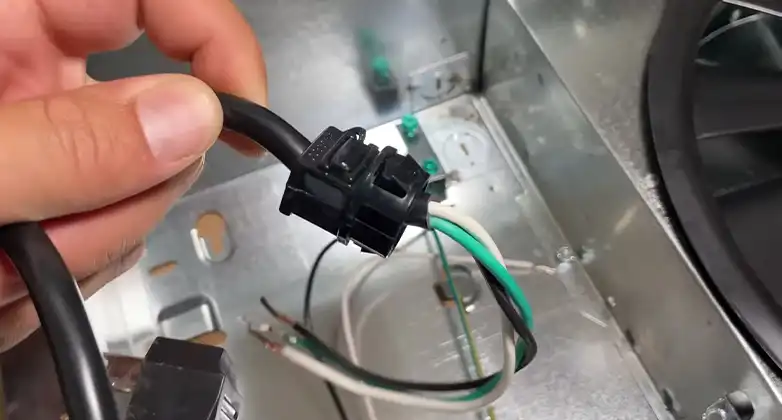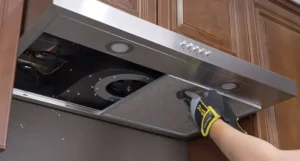A kitchen ventilation device helps to remove cooking vapors and smells from the kitchen area. This appliance is a must-have in every kitchen, but when it comes to its installation, people often wonder whether a separate circuit is necessary. The answer to this question is affirmative, as a kitchen hood uses up a substantial amount of energy and can lead to an overload on a shared circuit. Thus, fixing it on an exclusive circuit is crucial to guarantee secure and effective functioning.

Are Kitchen Hoods Required to Have Their Circuits?
Yes, kitchen hoods are typically required to have their circuits. This is because they draw a considerable amount of power and must be able to operate independently without affecting other appliances in the kitchen. Moreover, kitchen hoods often require a dedicated circuit to meet electrical code requirements and ensure proper electrical safety.
According to the National Electrical Code (NEC), kitchen hoods over 300 CFM (cubic feet per minute) or have a built-in lighting system must have their own circuit. This circuit must be dedicated solely to the kitchen hood and cannot be shared with other appliances or electrical loads.
The kitchen is the heart of any home, where delicious meals are prepared, and memories are created. However, with the hustle and bustle of cooking, the kitchen can quickly become hot and steamy. That’s where a kitchen hood comes in – it helps to extract smoke, steam, and other cooking odors from the kitchen, keeping the air clean and fresh.
But, when it comes to the electrical wiring of a kitchen hood, many homeowners are left wondering: Does a kitchen hood need its circuit? In this article, we will explore the answer to this question and provide the information you need to make an informed decision about your kitchen hood’s electrical wiring.
There Are Several Reasons Why a Kitchen Hood Needs its Circuit:
A kitchen hood, also known as a range hood or exhaust hood, is an essential appliance that helps to remove smoke, steam, and cooking odors from the kitchen while cooking. The hood is usually installed above the stove or cooktop, and it is essential to ensure that it has its dedicated circuit. Here are some reasons why a kitchen hood needs its circuit:
Reason 1. Power requirements:
Kitchen hoods require much power to operate, especially if they have built-in lighting or fans. Typically, they require between 120-240 volts of electricity, which is much power compared to other kitchen appliances. If the hood is not on its circuit, it can overload the existing circuit and cause a tripped breaker or blow a fuse.
Reason 2. Safety:
A kitchen hood not installed on its own circuit can pose a safety hazard. When the hood is not on its circuit, it is more susceptible to power surges and voltage drops, which can damage the appliance or cause a fire. By installing the hood on its circuit, you can ensure that it operates safely and efficiently without causing any safety concerns.
Reason 3. Convenience:
A dedicated circuit for your kitchen hood can make it more convenient. If the hood is not on its circuit, you may have to turn off other appliances or lights in the kitchen to prevent the circuit from overloading. However, if the hood has its circuit, you can use it without worrying about tripping the breaker or blowing a fuse.
Reason 4. Electric code compliance:
According to electrical codes, kitchen hoods must have their own dedicated circuit. These codes are in place to ensure that appliances are installed safely and do not pose a risk to the homeowner. By installing the hood on its own circuit, you can ensure your kitchen is up to code and compliant with safety regulations.
Reason 5. Protecting other appliances:
A kitchen hood can damage other kitchen appliances if it is not installed on its circuit. For example, if the hood causes a power surge, it can damage your refrigerator, stove, or other appliances. By installing the hood on its circuit, you can prevent this type of damage from occurring.
Frequently Asked Questions And Answers
How Do I Know If My Kitchen Hood Needs Its Circuit?
To identify the necessary power supply for your kitchen hood, please refer to the specifications provided by the manufacturer that pertain to your particular model. Typically, if your hood necessitates over 300 watts of electricity, it is advised to allocate a separate circuit.
Can I Install a Kitchen Hood Without a Dedicated Circuit?
While installing a kitchen hood without a dedicated circuit is possible, it is not recommended due to potential safety risks. Furthermore, adhering to local building codes that necessitate a dedicated kitchen hooded circuit could result in code violations.
Is It Possible to Install the Kitchen Hood Circuit Myself?
You should hire a licensed electrician to install a dedicated circuit for your kitchen hood to ensure safety and compliance. Such a professional can expertly handle the installation process while also assisting you in selecting the correct circuit size and verifying your home’s electrical panel capacity to accommodate the added load.
Conclusion
In summary, it’s crucial to prioritize safety and efficiency when installing or upgrading kitchen appliances. By ensuring that your kitchen hood has its own dedicated circuit, you can avoid potential hazards and ensure that it operates at its optimal capacity. Complying with electrical codes also protects you from legal and financial issues. Hiring a licensed electrician to handle the installation is crucial for a safe and smooth operation. With these steps in mind, you can enjoy a properly functioning kitchen hood and peace of mind knowing that your home and family are safe.

![Read more about the article [Explained] Can a Range Hood Vent Near a Window?](https://kitchenhoodcare.com/wp-content/uploads/2023/05/Can-a-Range-Hood-Vent-Near-a-Window-300x161.webp)

![Read more about the article [Explained] What Is the Correct Fuse for Cooker Hood?](https://kitchenhoodcare.com/wp-content/uploads/2023/05/What-Is-the-Correct-Fuse-for-Cooker-Hood-300x161.webp)